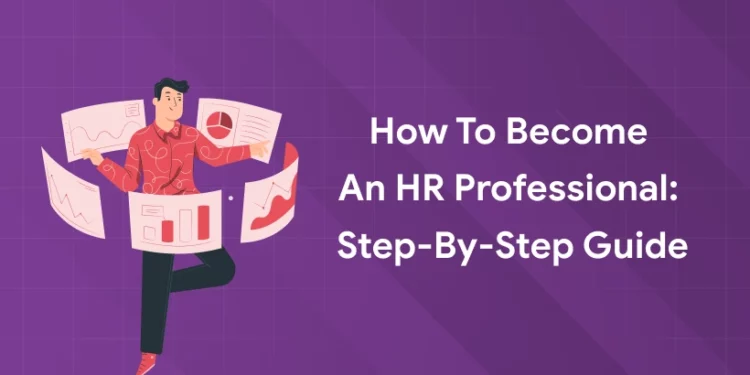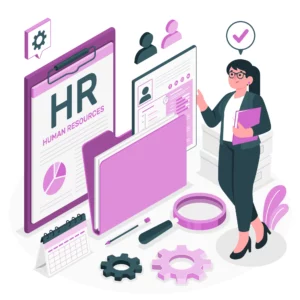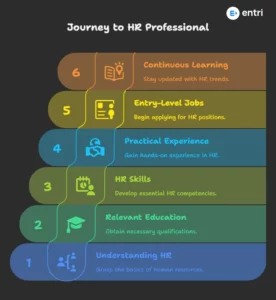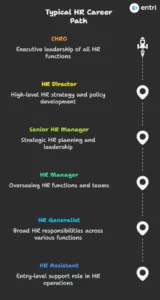Table of Contents
Have you seen those reels and shorts where the HR schedules “fun Fridays” and other sorts of activities? That’s just one of the many jobs of an HR professional. But, how does one become an HR professional? What is the roadmap for becoming a successful HR professional? This blog answers these questions with a complete step-by-step guide for you to achieve your dreams.
Check out this video by Entri in Malayalam!
Key Takeaways:
- HR is a people-focused, strategic career with high growth potential.
- You don’t need an HR degree, but education and certifications help.
- Building strong communication and organisational skills is crucial.
- Internships, volunteering, and networking are great ways to get started.
- HR offers diverse roles and paths – from recruiting to leadership.
Introduction
How does one realise if human resources is the right path for them? If this question were asked of the HR professionals, a major of them would say they had some sort of abilities or skills that made them eligible for what this profession demands of them. And some of the said qualities include enjoying working with people, solving problems, and having a knack for helping organisations grow.
If you feel like you have the same qualities, then a profession in HR is a suitable job for you. The false notion of HR beginning their day with ‘hiring’ and ending it with ‘firing’ is long gone as their profession is a strategic and dynamic field that plays an important and effective role in moulding the workplace culture, along with driving performance and managing talent.
This blog provides a complete and detailed step-by-step guide on how to become an HR professional, regardless of whether you are just a student exploring career opportunities, a professional looking to switch careers, or just curious about what the world of HR is like.
What Does an HR Professional Do?
The field of HR is ever-evolving with no fixed template on how it should work. On a frequent basis, the HR duties and obligations are updated, resulting in a dynamic and ever-growing sense within the professionals. These again differ based on the size and structure of the organisation they are a part of. Some of the basic key responsibilities of an HR professional include:
- Attracting, screening, and recruiting new and potential employees.
- Handle conflicts, morale, and engagement in the workplace effectively.
- Roll out due salary, benefits, and performance incentives.
- Investing in training and development by conducting workshops and regular skill-building sessions.
- Ensure all labor laws and internal policies are followed by the employer and the employee.
Also read: Functions of HR Management Every Business Needs To Know
Common HR Job Titles
-
HR Assistant
-
HR Generalist
-
Talent Acquisition Specialist
-
Learning & Development Manager
-
Employee Relations Officer
Become an HR Expert – Enroll in Our HR Management Course Today!
Unlock the secrets to effective Human Resource Management with our expert-led course! Learn recruitment, employee relations, performance management, and more to build a thriving workplace. Start your journey toward a successful HR career today!
Know MoreStep-by-Step Guide on How to Become an HR Professional
This step-by-step guide helps you get started and gives you an idea of how to become an HR professional.
Step 1: Understanding the Human Resources Field
Before you decide on HR as your profession, you need to understand what HR is truly about and why it is a relevant foundation of an organisation. The HR professionals do not just do administrative work; they involve a lot more strategies and functions that elevate their relevance in all walks of employment. The easy way is to ask yourself some questions like:
- Do I enjoy working with people?
- Am I interested in organisational behaviour and workplace culture?
- Am I a good listener and a good communicator?
These questions would give you an understanding of what the HR field is truly about and how good a fit you are in that aspect.
Step 2: Pursue the Relevant Education
Like in any other professional field, an HR professional needs experience and skills rather than a degree. Therefore, even though it is not mandatory, a formal education will give you a solid foundation in HR concepts, which you will be able to put into practice once you start your profession. These are the options you can consider as a formal education to lay the foundation for your career:
- Bachelor’s in Business Administration (BBA) with a specialization in HR
- Master’s in Business Administration (MBA) in HR
- Bachelor’s in Psychology or Sociology (followed by HR-specific training)
- HR Management Certification
Certifications (Optional)
Similar to degrees, certifications are not exactly required, but they provide a better edge to you, especially in competitive markets. Here are some of the top HR management certifications that you should consider:
- SHRM-CP/ SHRM-SCP (Society for Human Resource Management)
- PHR/ SPHR (HRCI – Human Resource Certification Institute)
- CIPD (UK-based HR qualification)
- Talent Management Practitioner or similar local certifications
These certifications would undoubtedly showcase your commitment to your profession and provide you with valuable insights into global HR trends and policies.
Also read: HR Certification vs HR Degree | Which One to Choose
Step 3: HR Skills
HR professionals are made up of a combination of soft and technical skills, making it a dynamic and interesting role. Developing skills on both the front helps you in creating an eccentric career path.
Soft Skills
-
Communication & active listening
-
Empathy and emotional intelligence
-
Conflict resolution
-
Ethics and discretion
Technical Skills
- Familiarity with HR software like HRIS (Human Resource Information System)
- Understanding and developing the ability to implement labor laws and regulations.
- Payroll and benefits administration.
- Decision-making based on data (HR Analytics)
These skills are not exclusive to HR and can be picked up from various internships, part-time roles, or volunteer opportunities.
Also read: Ethical Practices In Human Resource Management
Step 4: Practical Experience
As stated above, employers value and often look for experience even for entry-level roles. The golden rule, especially in the corporate sector, is that, ‘real-world experience and exposure teach you more than any textbook. Therefore, seek out and make use of ways to gain practical experience, such as:
- Applying for HR internships during or after your education
- Take part in campus recruitment activities or HR clubs
- Volunteer to help in hiring for NGOs and or student organisations
- Shadow HR professionals or even ask for inspirational and insightful interviews
Step 5: Start Applying for Entry-Level Jobs
Before blindly applying for jobs, you need to tailor a professional resume. This is where “first impressions count,” so take some time to sit down and craft a detailed resume along with an online presence through platforms like LinkedIn. Here are some tips that you can keep in mind while crafting your resume.
- Highlight relevant points like HR coursework, projects, and internships.
- Use action verbs like “coordinated”, “managed”, or “assisted” to showcase your experience.
- For LinkedIn, ask your professors or mentors for recommendations and endorsements.
- Be a part of relevant online HR groups and forums
Once you have the basics down with a well-crafted resume and a strong online presence, start applying for entry-level jobs. Be sure to read the job description and see if it aligns with your expectations and skills. Here are some of the entry-level roles that you can apply for:
-
HR Assistant
-
HR Coordinator
-
Recruitment Executive
-
People Operations Intern
These roles provide exposure and understanding of different HR roles. Remember to customise your cover letters according to the role you are applying for to be easily noticed.
Important: Beware of scammers and fake job posts that require you to make a payment before joining an organisation. Research well about the organisation and reach out to employees to get insights on how the organisation works. Once you are sure about the legitimacy, accept the offer letter.
Step 6: Continuous Learning
Learning is never-ending, especially in fields such as human resources. HR professionals need to develop a habit of learning continuously, as the field is an ever-evolving one and requires constant updating and upskilling. New laws, tools, and trends emerge constantly, from remote work to the role of AI in hiring. You can stay aware and sharp by:
-
Reading HR blogs and newsletters (like SHRM, People Matters)
-
Following thought leaders on LinkedIn
-
Attending webinars, conferences, and virtual events
-
Enrolling in ongoing courses or micro-certifications
Being proactive about learning can only benefit you and your career to great lengths.
Career Growth in HR
HR is one of the largest professional fields with scope for tremendous career growth. This is mainly because it offers multiple pathways and specialisations for one to climb the ladder within the department/field. Experience with profound results is the major factor that can boost you up the career ladder. Here is a typical career path for HR professionals to consider:
In terms of specialisations, you can consider these:
-
Talent Acquisition
-
Compensation & Benefits
-
Learning & Development
-
Employee Engagement
-
HR Analytics
-
Diversity, Equity & Inclusion (DEI)
Become an HR Expert – Enroll in Our HR Management Course Today!
Unlock the secrets to effective Human Resource Management with our expert-led course! Learn recruitment, employee relations, performance management, and more to build a thriving workplace. Start your journey toward a successful HR career today!
Know MoreFrequently Asked Questions
Can I become an HR professional without an HR degree?
Yes! Many professionals enter HR through business, psychology, or social science degrees, then gain HR experience or certifications.
Are certifications necessary to work in HR?
Not mandatory, but highly beneficial. They boost your credibility and improve your chances of promotion.
What is the starting salary for an HR professional?
It varies by country and role, but entry-level HR professionals typically earn a competitive salary with room for rapid growth.
What industries hire HR professionals?
Almost every industry – including healthcare, IT, education, manufacturing, retail, and finance — has HR departments.

















